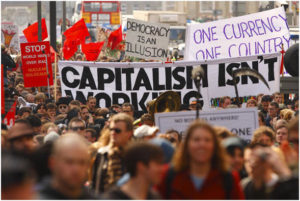
“THE greatest lesson that we can take from our history is that we can only implement our vision and apply our values when we win power and form a government,” Labour MP Owen Smith repeated ad nauseam during the recent Labour leadership contest.
Owen Jones, generally considered to be on the leIft of the Labour Party, seemed to echo Smith on the issue of power and influence on his YouTube channel in August 2016.
“Instead of sticking our fingers in our ears and going ‘lalalala it’s all fine’ there just needs to be strategy to improve those ratings,” the Guardian columnist argued about Labour’s poor poll ratings.
“Otherwise we are finished, and the Conservatives will run the country for years. I’ll just keep doing my videos whinging about things, coming up with ideas. Waste of time. Just words, isn’t it? Just words.”
However, despite what the two Owens assert about the futility of opposition, the historical record suggests a far more hopeful conclusion.
“Power is not the only factor instrumental in creating change,” Salim Lone, a former communications director at the United Nations, noted in a letter to the Guardian in May 2016.
“In fact it’s what one does in ‘opposition’ that has historically paved the way for real change. Humanity’s progress has resulted primarily from the struggles of those who fought for change against entrenched power.”
US author Rebecca Solnit agrees, noting just before the US presidential election that “election seasons erase the memory of movements that worked for years or decades, outside and around, below and above electoral politics.” She describes these as “the histories that matter.”
Producing change while not in power can broadly be separated into two camps: transformation that is forced on an unwilling ruling elite, and government policies that are stopped or modified by strong opposition.
And let’s not forget that any change from below almost always involves an extra-parliamentary direct action struggle, from the setting up of trade unions and women winning the vote to the success of the US civil rights movement in the 1950s and ’60s — all forced on an initially resistant ruling class.
In the 1990s direct action played a key role in stopping the “biggest road-building programme since the Romans” planned by the then Tory government and the attempt to introduce GM food to Britain.
Indeed, a close reading of the news demonstrates that successfully making change while not in power happens all the time.
Last month the Guardian headline was “Poland’s abortion ban proposal near collapse after mass protests.”
Back in Britain, Corbyn’s Labour Party has inflicted a number of defeats on the government — on planned cuts to tax credits and housing benefit, and the proposed prison contract with Saudi Arabia.
It was a Tory-led government, let’s not forget, that introduced gay marriage — 25 years after it introduced the anti-gay Section 28.
And responding to the Chancellor’s recent announcement about investing in the economy, shadow chancellor John McDonnell quipped: “It’s clear Philip Hammond is now borrowing from Labour to invest in his own speech.”
Unsurprisingly, governments will try to take the credit for any popular changes — former prime minister David Cameron making it known he had personally intervened in favour of legalising same-sex marriage, for example.
But rather than taking the powerful at their (retrospective and self-justifying) word, a more accurate explanation of the process of positive change is highlighted by Tony Benn’s famous dictum: “It’s the same each time with progress. First they ignore you, then they say you’re mad, then dangerous, then there’s a pause and then you can’t find anyone who disagrees with you.”
Of course, being in power is preferable to not being in power. Far more change is obviously possible when one is in control, when it can be planned, co-ordinated and sustained. Those attempting to force change from the outside do not have control of the process, the timing or the details.
However, it is important not to underestimate the power of social movements and activism — the power of “ordinary” people to create real, long-lasting change.
Indeed, with Donald Trump likely to be in the White House for the next four years it is essential this hopeful understanding of political change is widely understood and acted upon.
The signs are promising: with Trump reviled and distrusted by a large section of the US public, it is likely there will be a much-needed resurgence of progressive activism following the unjustified lull during the Obama administration.
Trump is dangerously unpredictable, so making predictions about his foreign policy is difficult, US dissident Noam Chomsky noted in a recent interview. However, he ended on a note of optimism: “What we can say is that popular mobilisation and activism, properly organised and conducted, can make a large difference.”
source

More Stories
Navalny’s death used to hide western failures in Ukraine and their support for Israel’s genocide
Gifts from Gaza
Vulture capital circles over the corpse of Ukraine…